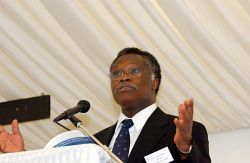Message du Secrétaire général du COE
Le programme de cette rencontre aidera le mouvement œcuménique à approfondir sa compréhen- sion de la vie en Christ
XVe Colloque œcuménique international de Bose
Le Christ transfiguré
dans la tradition spirituelle orthodoxe
16-19 septembre 2007
Texte original anglais
du message
du Secrétaire général du COE
aux participants au Colloque
Geneva, 13 September 2007
“….. a cloud came and overshadowed them; and they were terrified as they entered the cloud.
Then from the cloud came a voice that said, ‘This is my Son, my Chosen;- listen to him!’..”
(Luke 9: 34-35)
Eminent Reverends of the Monastery,
Dear Brothers and Sisters, Members of the Community,
Distinguished Participants of the 15th International Ecumenical Conference,
The Transfigured Christ in Orthodox Spiritual Tradition is the theme of the conference you will be reflecting upon with distinguished representatives of the Orthodox Church. Unfortunately, I will not be able to be with you on these days but my prayers and thoughts will be with you. Transfiguration is the self-revelation of Triune God. It aims at the transformation and renewal of humanity and creation. Transfiguration is the heart of Orthodox spirituality. The Orthodox churches place a particular emphasis on the community and the cosmic dimensions of spirituality, without ignoring the personal dimension. Transfiguration is also missionary engagement: it is the Fathers’ sending the Son to the world in the power of the Holy Spirit. Because Jesus was transfigured for the transfiguration of the world, the ecumenical movement must give special importance to life-centred spirituality.
The Feast of Transfiguration, with Epiphany, Resurrection and Pentecost is a constant reminder of the meaning of life in Christ. Transfiguration is the ultimate step in our understanding of our vocation and of ourselves as created in the image of God.
Life in Christ begins with the Eucharist, during which believers constantly renew their membership in the Body of Christ. Together, the Liturgy and the Eucharist lead us to examine our spiritual and social lives. The Eucharist helps us interpret the underlying principles in
Christian faith that set ethical guidelines for behaviour in society; it becomes the living expression of spirituality. In the Orthodox churches, “liturgy after liturgy”, which begins with Eucharist, is precisely living the event of transfiguration as community of faith. Liturgy after liturgy has influenced churches of other traditions in the ecumenical movement as well.
The agenda of this meeting and the papers read by the participants will help the ecumenical movement deepen its understanding of life in Christ. Transfigured Christ is the source of spirituality. Accepting Christ means participating in the event of transfiguration and taking Christ to the world. The Ninth Assembly of the World Council of Churches in 2006 identified spirituality as one of the programme priorities for the next seven years. The renewed emphasis on spirituality challenges and opens up questions to the WCC. One crucial question it raises is how does life in Christ reconcile spirituality and the application of ethical Christian principles to human situations? While the Council will be reflecting on this question with its member churches and learning from the Orthodox Churches, they should also be learning from the experiences of monastic communities and lay movements.
Encouraged by our past collaboration with the Monastery of Bose, we rest assured that your work and your experience of monastic life of prayer and contemplation will help us in our effort to make the life of Transfigured Christ the vision for a new life in this broken world.
Yours in Christ,
Rev. Dr Samuel Kobia
General Secretary
